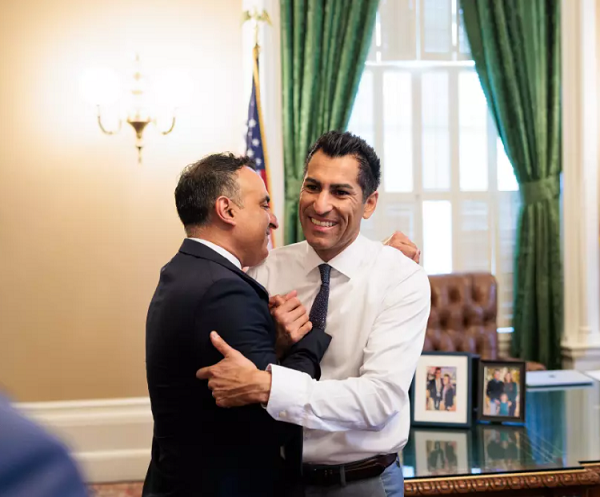Single-payer healthcare is a ‘tough, tough sell’ as California faces massive budget shortfall
By Anabel Sosa
February 21, 2024
 SACRAMENTO — California Assembly Speaker Robert Rivas cast doubt on the latest proposal to create a state-run single-payer healthcare system, saying he likes the idea but isn’t convinced the state can afford it in the face of a budget shortfall of at least $38 billion.
SACRAMENTO — California Assembly Speaker Robert Rivas cast doubt on the latest proposal to create a state-run single-payer healthcare system, saying he likes the idea but isn’t convinced the state can afford it in the face of a budget shortfall of at least $38 billion.
“The concept of single-payer and expanding access and affordability are good ideas,” Rivas, a Democrat from Hollister, told reporters at the state Capitol on Tuesday. “I say this with great respect to stakeholders and advocates: We need to see how this is funded. It’s a good idea but it’s a tough, tough sell, especially in a budget climate that we are experiencing now.”
Assembly Bill 2200, called Guaranteed Health Care for All — or CalCare — would set up a universal single-payer healthcare system for all residents of California. The bill by Assemblyman Ash Kalra (D-San José) is based on his prior single-payer legislation, which failed to get enough votes to move forward in January 2022.
A legislative analysis of that bill pegged the cost between $314 billion and $391 billion in state and federal funds — a sum that is larger than the entire state budget Gov. Gavin Newsom proposed for the 2024-25 fiscal year: $291.5 billion.
The Legislature’s analysts have not yet determined a price tag for Kalra’s new bill. He says it differs from his earlier attempt because it establishes an advisory committee, explicitly lists gender-affirming care and expansive reproductive care as benefits, requires an investment in the recruitment and retention of healthcare workers to meet the demand for services, and ensures that physicians are represented on the CalCare board.
Assemblyman Ash Kalra, D-San Jose, center, talks with Assemblywomen, Tasha Boemer Horvath, D-Encinitas, left, Rebecca Bauer-Kahan, D-Orinda, right, after he did not bring his universal health care bill up for a vote during the Assembly session in Sacramento, Calif., Monday, Jan. 31, 2022. The bill had to pass by midnight Monday to have a chance at becoming law this year. But after intense pressure from business groups and the insurance industry, Kalra realized it would not pass and decided not to bring it up to a vote.
Facing pressure from progressive activists and a politically engaged nurses union that has been pushing for single-payer healthcare, California lawmakers have tried about 10 times over the years to overhaul the state’s healthcare system.
The proposals usually wind up dividing Democrats and withering due to concerns over cost, opposition from private insurers and the complex bureaucracy that undergirds the nation’s delivery of healthcare.
Last year, Newsom signed a bill that would set the stage for universal healthcare by helping California obtain a waiver from the federal government to use Medicaid and Medicare funds for a potential single-payer system. The bill by Sen. Scott Wiener (D-San Francisco) was meant as an incremental step to address some of the logistical hurdles that had stymied earlier proposals for sweeping reform.
FILE–In this April 26, 2017, file photo, supporters of single-payer health care march to the Capitol in Sacramento, Calif. State experts say a California bill that would provide government-funded health coverage for everyone in the state would cost $400 billion and require significant tax increases.
The California Nurses Assn., a staunch advocate for single-payer healthcare, opposed Wiener’s bill, expressing skepticism over whether it would help create a single-payer system or simply facilitate an iteration of universal healthcare — which they say are different systems. A single-payer system means that the public receives health insurance through a centralized payer, usually through a government. Universal coverage generally refers to ensuring all residents have coverage through both public and private systems.
[READ FULL ARTICLE HERE]
